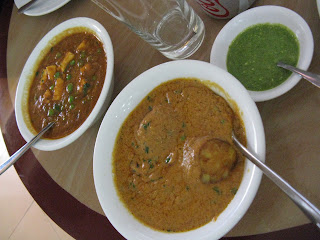Fleet Foxes
Helplessness Blues
Sub Pop Records 2011
Winter 2008. Seattle, Washington. I am curled into an off-white, overused blanket on a slumped piece of Ikea flotsam in a dismal, corporately-provided studio apartment in struggling-to-gentrify Belltown. A brief glance towards the calendar haplessly tacked to the paper-thin wall provides me with ephemeral relief. It's a Saturday, which at this point in my timorous existence signifies a day removed from the banality of Microsoft Office. A recklessly brash wind is rolling off of the Sound, shaking the panes of my sliding door, and I feel slightly prepared for the day... I had recently met a fine girl, maybe we would rendezvous for lunch or something.
As was my morning ritual at the time, I scraped the obstinate sleep from my overwrought eyes, muscled up some instant coffee, and cracked open that week's well-worn copy of The Stranger. Somewhere nestled amongst the words and pictures and erotic services' advertisements was a blurb about a local band with a penchant for vocal harmonies, woodsy imagery, and antiquated instrumentation.
I read with benign interest about these Fleet Foxes, purchased their second EP some months later, went to a few shows, and have since followed their rise to the ranks of indie royalty. Nellie and I have always felt a bit proprietary about their music, as if their meteoric ascent in the music world has mirrored our own tiny successes in life.
-------------
Fleet Foxes' distinctive brand of timeless, baroque chamber-folk has never failed to conjure up snapshots of overgrown, rural landscapes dotted with groves of fruit trees and cottages seeping into the flora. With Helplessness Blues, songwriter Robin Pecknold's lyrical density has evolved into an entirely new beast, giving the lush and evocative portraits we have come to expect from these guys a new, wistful dimension of personal existential confusion.
The plangent opening lines from "Montezuma", placed over a tactful arpeggio, quickly set the tone for the entire album:
Helplessness Blues
Sub Pop Records 2011
Winter 2008. Seattle, Washington. I am curled into an off-white, overused blanket on a slumped piece of Ikea flotsam in a dismal, corporately-provided studio apartment in struggling-to-gentrify Belltown. A brief glance towards the calendar haplessly tacked to the paper-thin wall provides me with ephemeral relief. It's a Saturday, which at this point in my timorous existence signifies a day removed from the banality of Microsoft Office. A recklessly brash wind is rolling off of the Sound, shaking the panes of my sliding door, and I feel slightly prepared for the day... I had recently met a fine girl, maybe we would rendezvous for lunch or something.
As was my morning ritual at the time, I scraped the obstinate sleep from my overwrought eyes, muscled up some instant coffee, and cracked open that week's well-worn copy of The Stranger. Somewhere nestled amongst the words and pictures and erotic services' advertisements was a blurb about a local band with a penchant for vocal harmonies, woodsy imagery, and antiquated instrumentation.
I read with benign interest about these Fleet Foxes, purchased their second EP some months later, went to a few shows, and have since followed their rise to the ranks of indie royalty. Nellie and I have always felt a bit proprietary about their music, as if their meteoric ascent in the music world has mirrored our own tiny successes in life.
-------------
Fleet Foxes' distinctive brand of timeless, baroque chamber-folk has never failed to conjure up snapshots of overgrown, rural landscapes dotted with groves of fruit trees and cottages seeping into the flora. With Helplessness Blues, songwriter Robin Pecknold's lyrical density has evolved into an entirely new beast, giving the lush and evocative portraits we have come to expect from these guys a new, wistful dimension of personal existential confusion.
The plangent opening lines from "Montezuma", placed over a tactful arpeggio, quickly set the tone for the entire album:
"So now I am older, than my mother and father, when they had their daughter, now what does that say about me?"Here we have a young man maturing in the Great Age of Expectations, coming to terms with one's place in a fickle era smothered in digitized information, obsessed with success, and faltering in its unending quest for perfection.
The eponymous single "Helplessness Blues", a standout from the middle of the album, further develops the idea of the individual vs. the collective. With a pensive Pecknold questioning the sociologically-dictated need to distinguish oneself from the pack, rather than fall seamlessly into a carefree existence based on anonymity. On a cursory first listen, it may be discounted as a Marxist ode best hummed on a permaculture commune ("If I had an orchard, I'd work 'till I was sore"); conversely, I read it as a response to the band's success and the struggles that accompany being an instantly recognizable face.
"The Shrine/An Argument" currently represents the musical apotheosis of the album for me. The abrupt switch from medieval harps tickling the surface of a hazy, pollen-choked afternoon to the pulsing, relentless onward momentum of "An Argument" is stirring. A great ride for its entirety, the song even culminates in a Beefheart moment - squealing atonal horns and a somewhat organized cacophony closing out what may be the weirdest addition to their song catalog. Stick around for the eight minutes and ye shall be rewarded fair listener.
Placed after the sparse, wistfully pretty "Blue-Spotted Tail" (a standout penultimate track that poses a line of metaphysical queries), "Grown Ocean" is a proper encore for the album. Akin to a Fleet Foxes' Greatest Hits album condensed into a single song, we get an inexorably-pounding, pseudo-tribal kick-drum beat, angelic harmonies, and abounding pastoral references to please the inner-Yeats in all of us. A good send-off for a thoughtfully constructed album.






























































